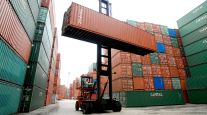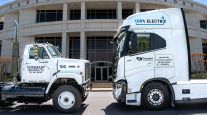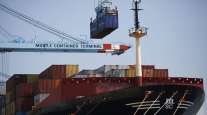Truckers, City of Long Beach File Lawsuits to Stop $500 Million BNSF Railway Terminal
This story appears in the June 17 print edition of Transport Topics.
Five California motor carriers, the city of Long Beach and an environmental group have filed lawsuits attempting to block construction of a $500 million BNSF Railway intermodal terminal near the Port of Los Angeles.
The lawsuits question the port’s environmental impact analysis that concluded the rail yard, known as the Southern California International Gateway, would improve the region’s air quality.
The five carriers also are challenging the port’s use of eminent domain to kick them off the 131-acre site.
“We were ignored in the sense that we’re being dislocated off of the port property with the loss of over 1,000 employees,” said Richard Haft, a Manhattan Beach, Calif., attorney who represents California Cartage Co., Three Rivers Trucking and San Pedro Forklift.
The other companies filing the lawsuit are Mortimer & Wallace Inc. and Fast Lane Transportation.
“At this point, after two years of negotiating with the port and the railroad, we really haven’t gotten anywhere,” Haft told Transport Topics.
Long Beach officials claim the pollution generated by the facility would not meet the state’s environmental requirements and will negatively affect nearby residents in West Long Beach, a low-income, minority neighborhood.
“Because this area already suffers from extensive air pollution, the project’s impact on public health, including the health of children in nearby schools and the residents of a supportive housing facility serving homeless veterans and families, is expected to be devastating,” the city said in its June 5 lawsuit filed in state court in Los Angeles.
Also filing a lawsuit was the Natural Resources Defense Council, which said the port’s approval of the project represents a case of “environmental injustice.”
The primary purpose of the project, approved by the city and port of Los Angeles in May, is to provide an additional near-dock intermodal rail facility that would serve the Port of Los Angeles and the Port of Long Beach.
The scope of the approved project is extensive and long-term. It will include the construction of about 20 miles of new train tracks, new and expanded rail bridges, paved roadways, a truck gate complex on-site and a new interchange on the nearby Pacific Coast Highway.
By 2035, the project will result in 2 million truck trips a year, loading and unloading up to 1.5 million shipping containers annually, Long Beach officials said.
Haft said the five companies, which consider themselves “port-dependent small-business owners,” are being forced to relocate from the facilities they either have owned or leased on the property for the past 25 to 50 years.
“The SCIG Project is a major project for the city of Los Angeles in which BNSF will invest $500 million for a state-of-the-art green rail facility, create good jobs and provide a strategic advantage for the San Pedro Bay Ports to move cargo through the Alameda Corridor and reduce regional pollution impacts,” said Port of Los Angeles spokeswoman Rachel Campbell.
“The Port of Los Angeles is confident that the SCIG environmental impact report fully complies with the California Environmental Quality Act and is prepared to defend it in court,” Campbell added.
The lawsuits “contain numerous inaccurate statements and assertions,” a BNSF spokeswoman said.
“After eight years of study, the in-depth environmental review of this project demonstrates that continuation of the existing trucking operations will not reduce pollution the way SCIG can,” spokeswoman Lena Kent said.
Although the Long Beach Board of Harbor Commissioners has not yet voted on whether to formally support the city of Long Beach’s lawsuit, “It’s fair to say that our board has joined the mayor and city council in objecting to the current plans for the SCIG,” said port spokesman Art Wong.




